(人教版2019)高考英语 一轮复习夯实基础必背知识清单 专题02. 选择性必修第2册 Unit 2 Bridging Cultures
文档属性
| 名称 | (人教版2019)高考英语 一轮复习夯实基础必背知识清单 专题02. 选择性必修第2册 Unit 2 Bridging Cultures |
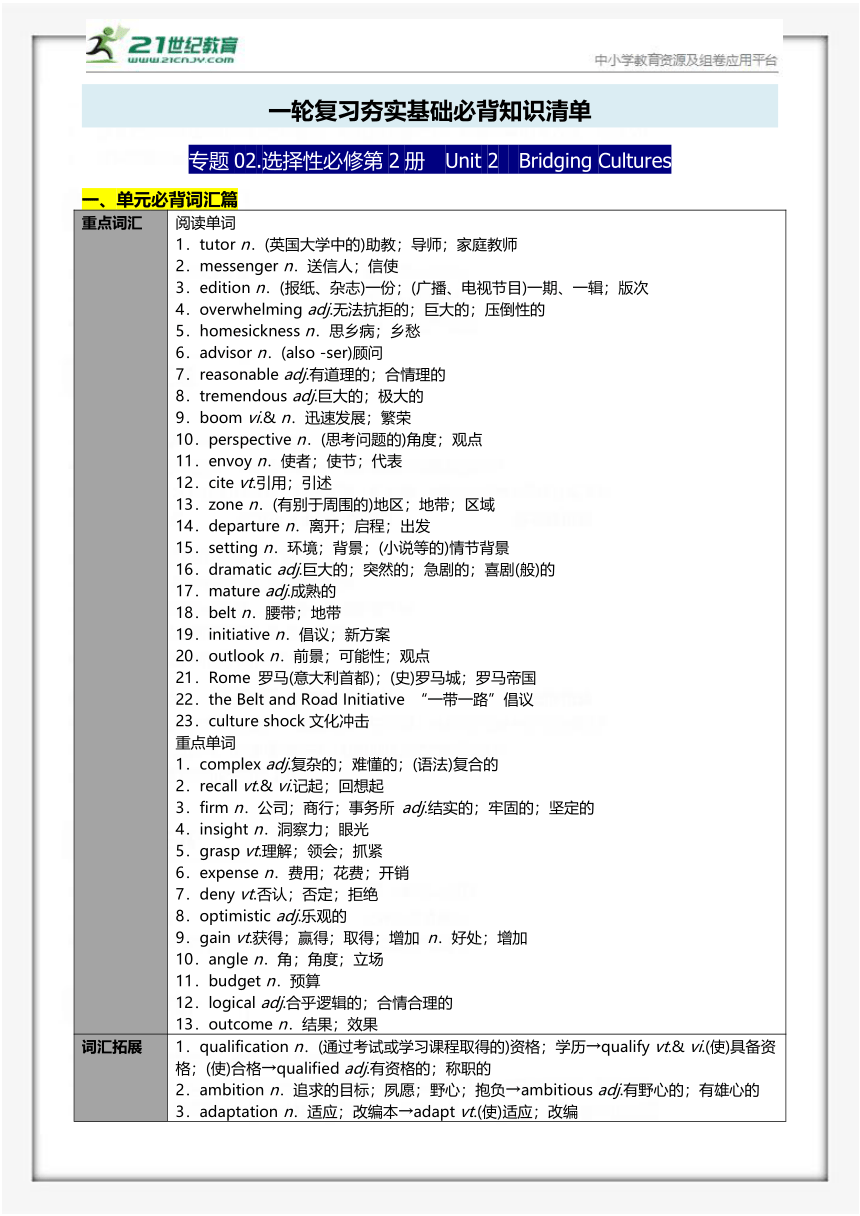
|
|
| 格式 | docx | ||
| 文件大小 | 114.6KB | ||
| 资源类型 | 试卷 | ||
| 版本资源 | 人教版(2019) | ||
| 科目 | 英语 | ||
| 更新时间 | 2022-11-18 17:44:27 | ||
图片预览

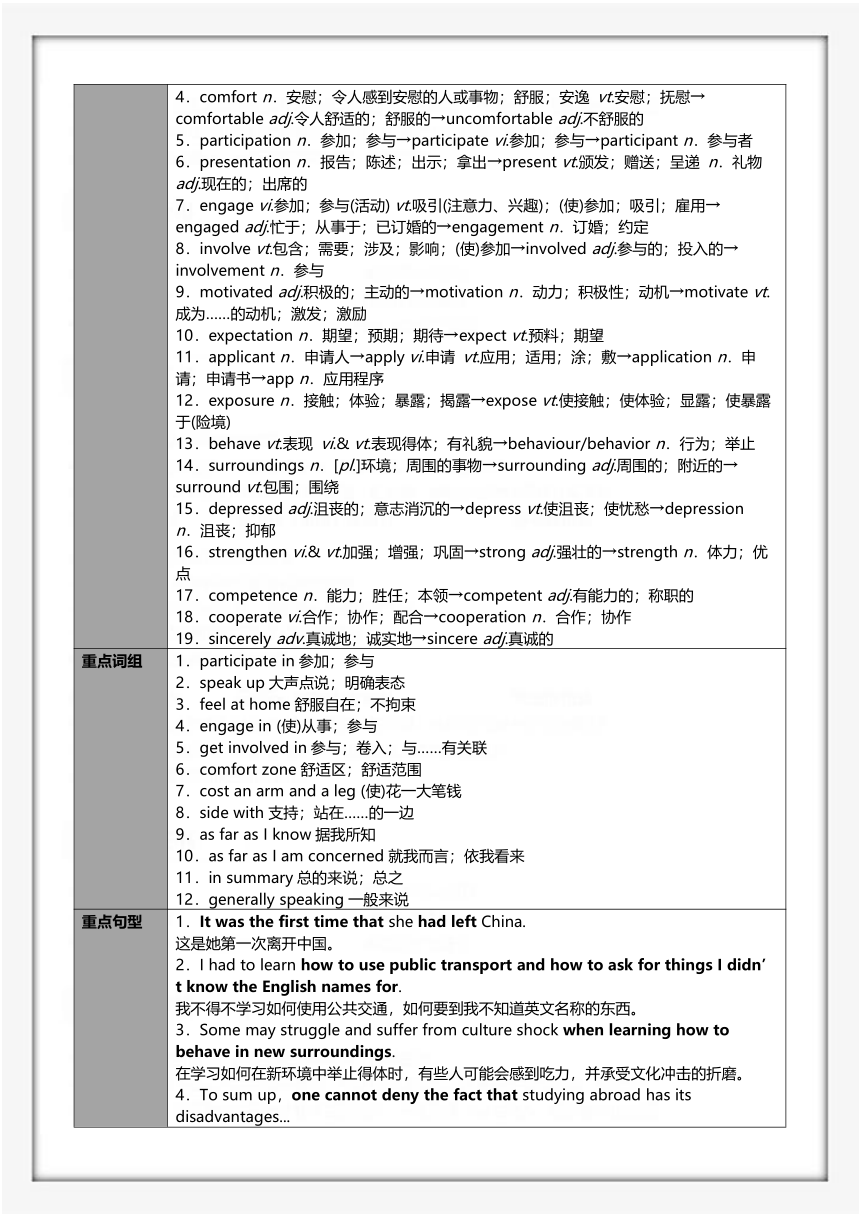
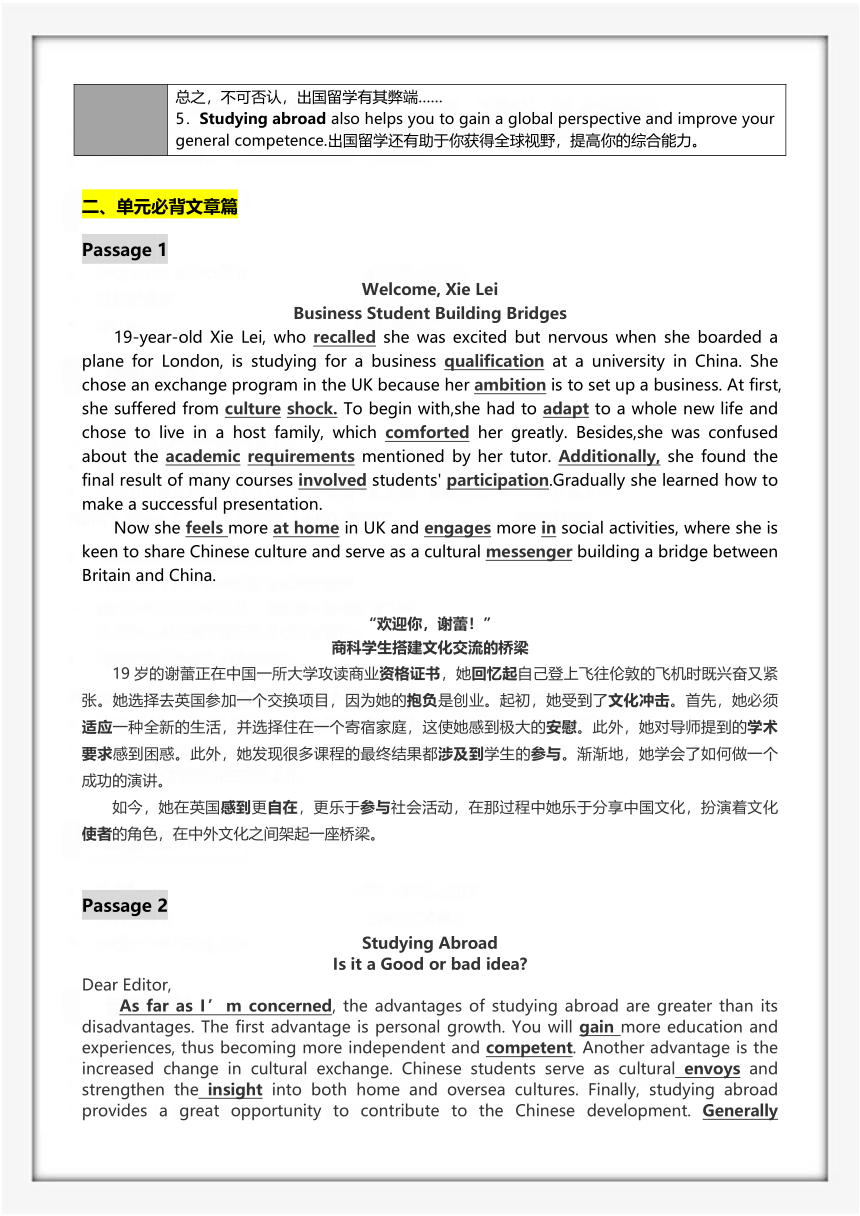
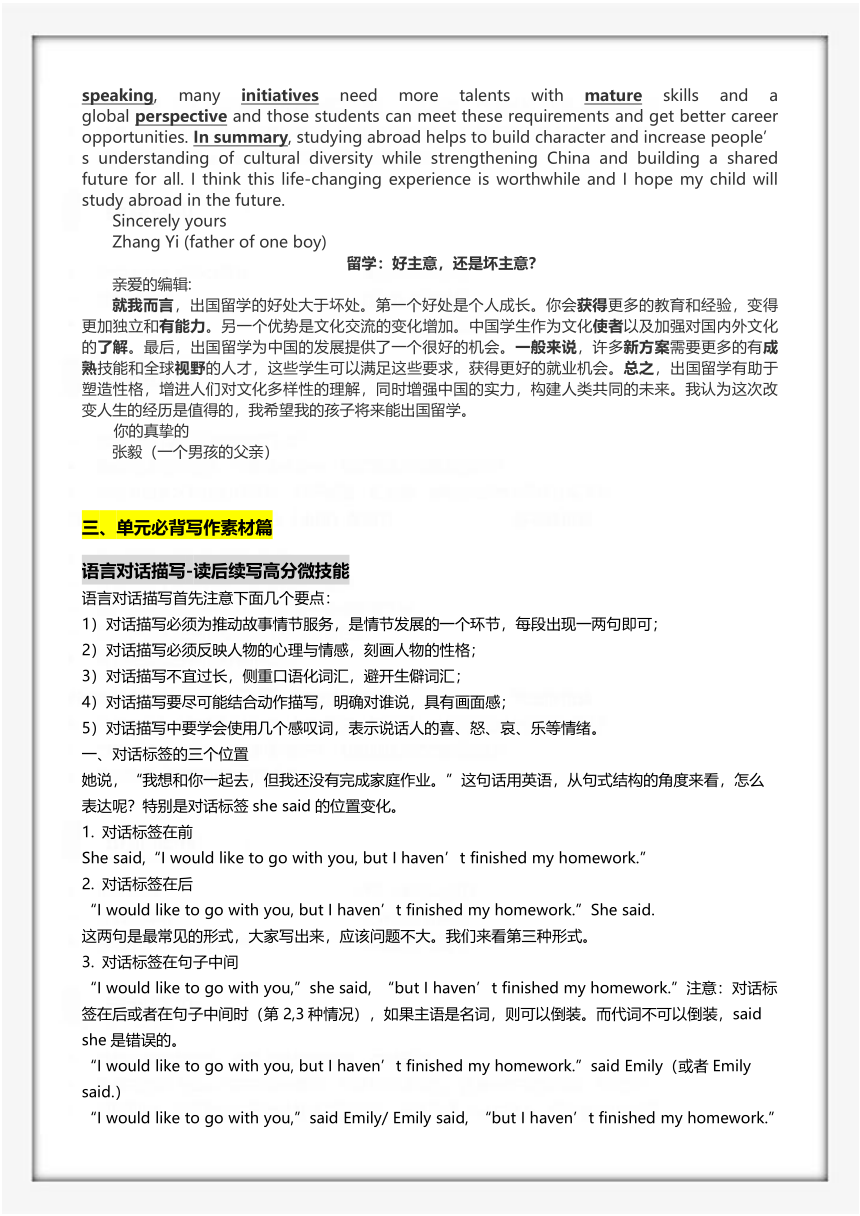
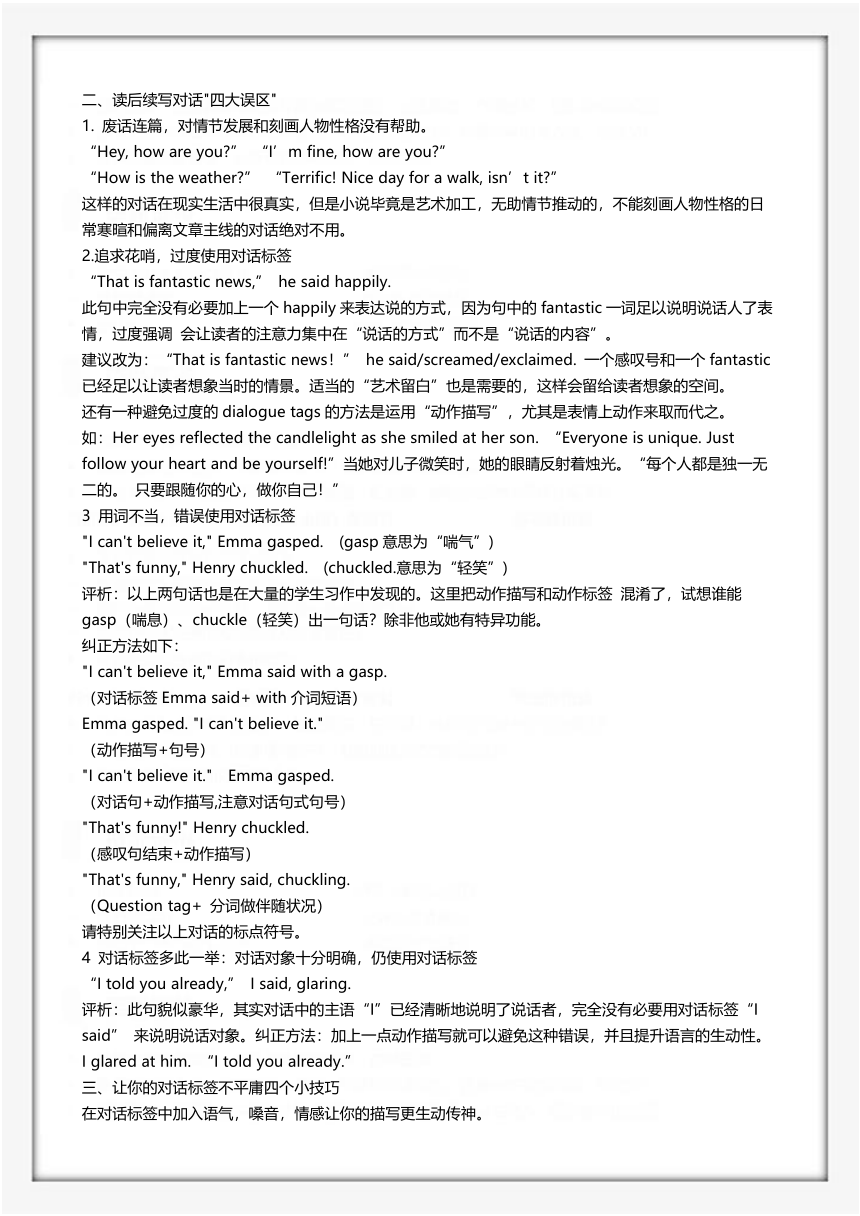
文档简介
一轮复习夯实基础必背知识清单
专题02.选择性必修第2册 Unit 2 Bridging Cultures
一、单元必背词汇篇
重点词汇 阅读单词 1.tutor n.(英国大学中的)助教;导师;家庭教师 2.messenger n.送信人;信使 3.edition n.(报纸、杂志)一份;(广播、电视节目)一期、一辑;版次 4.overwhelming adj.无法抗拒的;巨大的;压倒性的 5.homesickness n.思乡病;乡愁 6.advisor n.(also -ser)顾问 7.reasonable adj.有道理的;合情理的 8.tremendous adj.巨大的;极大的 9.boom vi.& n.迅速发展;繁荣 10.perspective n.(思考问题的)角度;观点 11.envoy n.使者;使节;代表 12.cite vt.引用;引述 13.zone n.(有别于周围的)地区;地带;区域 14.departure n.离开;启程;出发 15.setting n.环境;背景;(小说等的)情节背景 16.dramatic adj.巨大的;突然的;急剧的;喜剧(般)的 17.mature adj.成熟的 18.belt n.腰带;地带 19.initiative n.倡议;新方案 20.outlook n.前景;可能性;观点 21.Rome 罗马(意大利首都);(史)罗马城;罗马帝国 22.the Belt and Road Initiative “一带一路”倡议 23.culture shock文化冲击 重点单词 1.complex adj.复杂的;难懂的;(语法)复合的 2.recall vt.& vi.记起;回想起 3.firm n.公司;商行;事务所 adj.结实的;牢固的;坚定的 4.insight n.洞察力;眼光 5.grasp vt.理解;领会;抓紧 6.expense n.费用;花费;开销 7.deny vt.否认;否定;拒绝 8.optimistic adj.乐观的 9.gain vt.获得;赢得;取得;增加 n.好处;增加 10.angle n.角;角度;立场 11.budget n.预算 12.logical adj.合乎逻辑的;合情合理的 13.outcome n.结果;效果
词汇拓展 1.qualification n.(通过考试或学习课程取得的)资格;学历→qualify vt.& vi.(使)具备资格;(使)合格→qualified adj.有资格的;称职的 2.ambition n.追求的目标;夙愿;野心;抱负→ambitious adj.有野心的;有雄心的 3.adaptation n.适应;改编本→adapt vt.(使)适应;改编 4.comfort n.安慰;令人感到安慰的人或事物;舒服;安逸 vt.安慰;抚慰→comfortable adj.令人舒适的;舒服的→uncomfortable adj.不舒服的 5.participation n.参加;参与→participate vi.参加;参与→participant n.参与者 6.presentation n.报告;陈述;出示;拿出→present vt.颁发;赠送;呈递 n.礼物 adj.现在的;出席的 7.engage vi.参加;参与(活动) vt.吸引(注意力、兴趣);(使)参加;吸引;雇用→engaged adj.忙于;从事于;已订婚的→engagement n.订婚;约定 8.involve vt.包含;需要;涉及;影响;(使)参加→involved adj.参与的;投入的→involvement n.参与 9.motivated adj.积极的;主动的→motivation n.动力;积极性;动机→motivate vt.成为……的动机;激发;激励 10.expectation n.期望;预期;期待→expect vt.预料;期望 11.applicant n.申请人→apply vi.申请 vt.应用;适用;涂;敷→application n.申请;申请书→app n.应用程序 12.exposure n.接触;体验;暴露;揭露→expose vt.使接触;使体验;显露;使暴露于(险境) 13.behave vt.表现 vi.& vt.表现得体;有礼貌→behaviour/behavior n.行为;举止 14.surroundings n.[pl.]环境;周围的事物→surrounding adj.周围的;附近的→surround vt.包围;围绕 15.depressed adj.沮丧的;意志消沉的→depress vt.使沮丧;使忧愁→depression n.沮丧;抑郁 16.strengthen vi.& vt.加强;增强;巩固→strong adj.强壮的→strength n.体力;优点 17.competence n.能力;胜任;本领→competent adj.有能力的;称职的 18.cooperate vi.合作;协作;配合→cooperation n.合作;协作 19.sincerely adv.真诚地;诚实地→sincere adj.真诚的
重点词组 1.participate in参加;参与 2.speak up大声点说;明确表态 3.feel at home舒服自在;不拘束 4.engage in (使)从事;参与 5.get involved in参与;卷入;与……有关联 6.comfort zone舒适区;舒适范围 7.cost an arm and a leg (使)花一大笔钱 8.side with支持;站在……的一边 9.as far as I know据我所知 10.as far as I am concerned就我而言;依我看来 11.in summary总的来说;总之 12.generally speaking一般来说
重点句型 1.It was the first time that she had left China. 这是她第一次离开中国。 2.I had to learn how to use public transport and how to ask for things I didn’t know the English names for. 我不得不学习如何使用公共交通,如何要到我不知道英文名称的东西。 3.Some may struggle and suffer from culture shock when learning how to behave in new surroundings. 在学习如何在新环境中举止得体时,有些人可能会感到吃力,并承受文化冲击的折磨。 4.To sum up,one cannot deny the fact that studying abroad has its disadvantages... 总之,不可否认,出国留学有其弊端…… 5.Studying abroad also helps you to gain a global perspective and improve your general competence.出国留学还有助于你获得全球视野,提高你的综合能力。
单元必背文章篇
Passage 1
Welcome, Xie Lei
Business Student Building Bridges
19-year-old Xie Lei, who recalled she was excited but nervous when she boarded a plane for London, is studying for a business qualification at a university in China. She chose an exchange program in the UK because her ambition is to set up a business. At first, she suffered from culture shock. To begin with,she had to adapt to a whole new life and chose to live in a host family, which comforted her greatly. Besides,she was confused about the academic requirements mentioned by her tutor. Additionally, she found the final result of many courses involved students' participation.Gradually she learned how to make a successful presentation.
Now she feels more at home in UK and engages more in social activities, where she is keen to share Chinese culture and serve as a cultural messenger building a bridge between Britain and China.
“欢迎你,谢蕾!”
商科学生搭建文化交流的桥梁
19岁的谢蕾正在中国一所大学攻读商业资格证书,她回忆起自己登上飞往伦敦的飞机时既兴奋又紧张。她选择去英国参加一个交换项目,因为她的抱负是创业。起初,她受到了文化冲击。首先,她必须适应一种全新的生活,并选择住在一个寄宿家庭,这使她感到极大的安慰。此外,她对导师提到的学术要求感到困惑。此外,她发现很多课程的最终结果都涉及到学生的参与。渐渐地,她学会了如何做一个成功的演讲。
如今,她在英国感到更自在,更乐于参与社会活动,在那过程中她乐于分享中国文化,扮演着文化使者的角色,在中外文化之间架起一座桥梁。
Passage 2
Studying Abroad
Is it a Good or bad idea
Dear Editor,
As far as I’m concerned, the advantages of studying abroad are greater than its disadvantages. The first advantage is personal growth. You will gain more education and experiences, thus becoming more independent and competent. Another advantage is the increased change in cultural exchange. Chinese students serve as cultural envoys and strengthen the insight into both home and oversea cultures. Finally, studying abroad provides a great opportunity to contribute to the Chinese development. Generally speaking, many initiatives need more talents with mature skills and a global perspective and those students can meet these requirements and get better career opportunities. In summary, studying abroad helps to build character and increase people’s understanding of cultural diversity while strengthening China and building a shared future for all. I think this life-changing experience is worthwhile and I hope my child will study abroad in the future.
Sincerely yours
Zhang Yi (father of one boy)
留学:好主意,还是坏主意?
亲爱的编辑:
就我而言,出国留学的好处大于坏处。第一个好处是个人成长。你会获得更多的教育和经验,变得更加独立和有能力。另一个优势是文化交流的变化增加。中国学生作为文化使者以及加强对国内外文化的了解。最后,出国留学为中国的发展提供了一个很好的机会。一般来说,许多新方案需要更多的有成熟技能和全球视野的人才,这些学生可以满足这些要求,获得更好的就业机会。总之,出国留学有助于塑造性格,增进人们对文化多样性的理解,同时增强中国的实力,构建人类共同的未来。我认为这次改变人生的经历是值得的,我希望我的孩子将来能出国留学。
你的真挚的
张毅(一个男孩的父亲)
三、单元必背写作素材篇
语言对话描写-读后续写高分微技能
语言对话描写首先注意下面几个要点:
1)对话描写必须为推动故事情节服务,是情节发展的一个环节,每段出现一两句即可;
2)对话描写必须反映人物的心理与情感,刻画人物的性格;
3)对话描写不宜过长,侧重口语化词汇,避开生僻词汇;
4)对话描写要尽可能结合动作描写,明确对谁说,具有画面感;
对话描写中要学会使用几个感叹词,表示说话人的喜、怒、哀、乐等情绪。
一、对话标签的三个位置
她说,“我想和你一起去,但我还没有完成家庭作业。”这句话用英语,从句式结构的角度来看,怎么表达呢?特别是对话标签she said的位置变化。
1. 对话标签在前
She said,“I would like to go with you, but I haven’t finished my homework.”
2. 对话标签在后
“I would like to go with you, but I haven’t finished my homework.”She said.
这两句是最常见的形式,大家写出来,应该问题不大。我们来看第三种形式。
3. 对话标签在句子中间
“I would like to go with you,”she said, “but I haven’t finished my homework.”注意:对话标签在后或者在句子中间时(第2,3种情况),如果主语是名词,则可以倒装。而代词不可以倒装,said she是错误的。
“I would like to go with you, but I haven’t finished my homework.”said Emily(或者Emily said.)
“I would like to go with you,”said Emily/ Emily said, “but I haven’t finished my homework.”
二、读后续写对话"四大误区"
1. 废话连篇,对情节发展和刻画人物性格没有帮助。
“Hey, how are you ” “I’m fine, how are you ”
“How is the weather ” “Terrific! Nice day for a walk, isn’t it ”
这样的对话在现实生活中很真实,但是小说毕竟是艺术加工,无助情节推动的,不能刻画人物性格的日常寒暄和偏离文章主线的对话绝对不用。
2.追求花哨,过度使用对话标签
“That is fantastic news,” he said happily.
此句中完全没有必要加上一个happily来表达说的方式,因为句中的fantastic一词足以说明说话人了表情,过度强调 会让读者的注意力集中在“说话的方式”而不是“说话的内容”。
建议改为:“That is fantastic news!” he said/screamed/exclaimed. 一个感叹号和一个fantastic已经足以让读者想象当时的情景。适当的“艺术留白”也是需要的,这样会留给读者想象的空间。
还有一种避免过度的dialogue tags的方法是运用“动作描写”,尤其是表情上动作来取而代之。
如:Her eyes reflected the candlelight as she smiled at her son. “Everyone is unique. Just follow your heart and be yourself!”当她对儿子微笑时,她的眼睛反射着烛光。“每个人都是独一无二的。 只要跟随你的心,做你自己!”
3 用词不当,错误使用对话标签
"I can't believe it," Emma gasped. (gasp意思为“喘气”)
"That's funny," Henry chuckled. (chuckled.意思为“轻笑”)
评析:以上两句话也是在大量的学生习作中发现的。这里把动作描写和动作标签 混淆了,试想谁能gasp(喘息)、chuckle(轻笑)出一句话?除非他或她有特异功能。
纠正方法如下:
"I can't believe it," Emma said with a gasp.
(对话标签Emma said+ with介词短语)
Emma gasped. "I can't believe it."
(动作描写+句号)
"I can't believe it." Emma gasped.
(对话句+动作描写,注意对话句式句号)
"That's funny!" Henry chuckled.
(感叹句结束+动作描写)
"That's funny," Henry said, chuckling.
(Question tag+ 分词做伴随状况)
请特别关注以上对话的标点符号。
4 对话标签多此一举:对话对象十分明确,仍使用对话标签
“I told you already,” I said, glaring.
评析:此句貌似豪华,其实对话中的主语“I”已经清晰地说明了说话者,完全没有必要用对话标签“I said” 来说明说话对象。纠正方法:加上一点动作描写就可以避免这种错误,并且提升语言的生动性。
I glared at him. “I told you already.”
三、让你的对话标签不平庸四个小技巧
在对话标签中加入语气,嗓音,情感让你的描写更生动传神。
①第一种:加语气
“I would love to,” said Emily in a pleasant tone. “我很乐意这样做,”艾米丽用一种愉快的语气说。
这里用到了“in a pleasant tone. ”,即“用一种愉快的语气”,基本结构为:in a/an+形容词+tone
如:in a pleasant愉悦的/firm坚定的/rude粗鲁的/sad悲伤的 tone
也可以用 in a tone of +名词的搭配
如:in a tone of surprise用一种惊讶的语气
in a tone of curiosity用一种好奇的语气
in a tone of impatience用一种不耐烦的语气
in a tone of command用一种命令的语气
② 第二种:加嗓音
“I didn’t mean to,” she murmured in a low voice. “我不是故意的,”她低声说。
这里用到了“ in a low voice”,即“小声地说道”或者“用一种...声音”,基本结构是:in a/an+形容词+voice
如:in a high /low / sweet/loud/soft /weak voice 用一个高/低/甜/响亮/软/弱的声音
③第三种:加情感
“I...I.. don’t think I’m right for the part,”I replied with embarrassment.“我...我..认为我不适合这个角色,”我尴尬地回答。
这里用到了“ with embarrassment”,即“(伴随着)难堪”,基本结构是:with +情感名词。如with excitement (伴随着)激动。
④加副词
“我再也不会那样做了,”我回答。如何丰富这句话里的对话标签呢?
“I will never do that again,” I answered firmly. 加上了副词firmly(坚定地)
这句话也可以这么写:可将副词提到句首。
Firmly,I answered,“I will never do that again.”
素材积累:好词好句赏析
1. He stiffened(僵硬) for seconds and then shuffled (拖曳、慢慢走) his feetforward, eyes red with fury(愤怒) but without any fear or hesitation.
2. George and I stood there dumbfounded(哑然失声的,发楞的) watching him finishing the whole job, gratitude and admiration rushing in my heart(感激和仰慕涌入我心).
3. Hearing the bad news, Mary fainted away on the spot and fell into unconsciousness.(当场晕倒,陷入昏迷)
4. His eyes widened further and his mouth opened. He took a huge breath as if winded(喘不过气). He looked tortured-vulnerable. 他的眼睛瞪大了,嘴巴张开。他深深地吸了一口气仿佛呼吸困难,他看起来饱受折磨,非常脆弱。
5. Approaching me with a great deal of obvious discomfort, Tommy looked up at me with pleading(乞求的)eyes.
6. There was a light touch on my hand; looking down, I saw my son looking at me, curious.我感觉到有人轻轻碰触我的手;低头一看,是我的儿子好奇地在看我。
7. Every knock on the door fills me with expectation(让我充满期待). I immediately picture him walking through(想象某人做某事) the door.
8. He looked out of the window, biting his lips, as if thinking.他一边看着窗外,一边咬着嘴唇,仿佛在思考。
9. At the sight of the ferocious wolf, I was seized by a strong sense of horror and my palms were sweating. (被深深地恐惧感所控制,手心出汗)
10. Upon hearing the bad news, her heart ached, tears streaming down her cheeks. (心痛,眼泪直流)
四、单元必背语法篇
Grammar 名词性从句
[观察例句]
1.What seemed strange before now appears quite normal to Xie Lei.
2.It's important that Xie Lei keeps a balance between her studies and her social life.
3.That is why today over 40% of Californians speak Spanish as a first or second language.
4.Her tutor explained that she was supposed to read lots of information to help form a wise opinion of her own.
5.He made it quite clear that he preferred to study English.
6.The fact that she seemed to develop normally was very encouraging.
[归纳用法]
1.以上所有例句皆为主从复合句,句中用了相当于名词作用的从句(即名词性从句)在句中充当成分。
2.例句1为what引导的主语从句。例句2中it为形式主语,真正的主语为后面that引导的主语从句。
3.例句3为why引导的表语从句。
4.例句4为that引导的宾语从句。例句5中it为形式宾语,真正的宾语为后面that引导的宾语从句。
5.例句6为that引导的同位语从句。
名词性从句是在句子中起名词作用的句子。名词性从句的功能相当于名词词组,它在复合句中能担任主语、宾语、表语、同位语等,因此根据它在句中不同的语法功能,名词性从句又可分别称为主语从句、宾语从句、表语从句和同位语从句。
一、名词性从句的连接词
引导名词性从句的连接词有三个连词、五个连接代词、四个连接副词。
连接词 词形 词义 在从句中所作的成分
连词 that × ×
if/whether 是否 ×
连接代词 who(ever) (无论)谁(主格) 主语、表语、宾语
whom(ever) (无论)谁(宾格) 表语、宾语
whose(ever) (无论)谁的(所有格) 定语
what(ever) (无论)什么 主语、宾语、表语、定语
which(ever) (无论)哪个 主语、宾语、定语
连接副词 when(ever) (无论)什么时候 状语
where(ever) (无论)在哪里 状语
how(ever) (无论)怎样,怎么 状语
why 为什么 状语
二、主语从句
主语从句是指在句中作主语的从句,位置与陈述句的主语相同。
What is not to our satisfaction is that the price of the meal is a little too high.
我们不满意的是饭菜的价格稍微有点高。
How the book will sell depends on its author.
这本书如何销售取决于作者本人。
Where we shall have the meeting makes no difference.
我们在哪儿开会都无所谓。
1.that引导主语从句,在从句中不充当任何成分,仅起连接作用,但不可省略。
That you will win the medal seems unlikely.
你想获得奖牌看起来是不可能的。
2.whether引导的主语从句既可放在句首也可放在句尾,但if引导的主语从句只能放在句尾,前面需要用it作形式主语。
Whether the sports meeting will be held is not certain now.
运动会是否将举行现在不能确定。
Whether the work can be completed on time is doubtful.
=It is doubtful whether/if the work can be completed on time.
这项工作能否按时完成还不确定。
3.若主语部分结构较长,可以使用形式主语it,把真正的主语从句放于后面。
It is announced that our school is going to start an activity of “Crazy English” before daily morning exercises.
学校通知每日早操前将开展“疯狂英语”活动。
It is necessary that people should learn to face the reality.
人们应该学会面对现实是有必要的。
[即学即练1] 单句语法填空
① is certain that she will do well in her exam.
② we understand things has a lot to do with what we feel.
③It is reported a new film will be put on in the cinema.
【答案】1.It 2.How 3.that
三、宾语从句
在主从复合句中作宾语的从句叫宾语从句。宾语从句在句中可以作及物动词、介词或一些形容词的宾语。
Everyone knows that the earth is made up of matter.
每个人都知道地球是由物质构成的。
I doubt whether he will be elected as chairman.
我怀疑他是否会当选为主席。
These two areas are similar in that they both have high rainfall in summer.
这两个地区相似,因为在夏天降水都很多。
I'm not certain whether the train will arrive on time.
我不确信火车是否将会按时到达。
1.that引导宾语从句,既无语法功能,也无词汇意义,常被省略。但多个并列从句出现时,第一个that可以省略,其他的不能省略。
She said (that) she would come here and that I should wait for her till Monday.
她说她将会来这儿并让我等到星期一。
2.if和whether引导宾语从句的区别:
①在动词不定式之前只能用 whether。
②在whether...or not 的固定搭配中,只用 whether。
③在介词后,只能用whether。
④作 discuss 的宾语时,只能用 whether。
⑤宾语从句放在句首表示强调时,只能用 whether。
3.带复合宾语(宾语+宾语补足语)的句子,that引导的宾语从句经常移到句子后面,而用it作形式宾语。
4.表示喜欢、憎恶等心理活动的动词后习惯上先加个形式宾语it,再接宾语从句。例如:hate,dislike,love,don't mind,feel like,appreciate,rely on,count on,see to等。
We think it possible that you can finish the work today.我们认为你今天能够完成这项工作。
5.宾语从句的否定转移:think,believe,suppose,imagine等动词后的宾语从句中的否定词要转移到主句中,即主句的谓语动词用否定式,而从句的谓语动词用肯定式。
I don't think we need to waste much time on it.
我想我们不必在这上面浪费太多时间。(形式上否定)
[即学即练2] 单句语法填空
①I hate it when they talk with their mouths full of food.
②Once we were left to decide whether to have a picnic in a park or go to a museum.
③I want to be liked and loved for what I am inside.
四、表语从句
表语从句在复合句中作表语,出现在连系动词之后,一般结构为“主语+连系动词+表语从句”。可接表语从句的连系动词有be,look,remain,seem等。
The question is whether we can finish the work in time.
问题在于我们是否能及时完成这项工作。
1.that在引导表语从句时无词义,在从句中不充当任何成分,仅起连接作用,不可以省略。
The fact remains that we are still not advanced enough.
事实依然是我们还是不够先进。
2.whether可引导表语从句,但if却通常不用于引导表语从句。
His first question was whether Tom had arrived yet.
他的首要问题是汤姆是否已经到达。
3.引导表语从句的引导词还可用because,as if,as though,as。
The sky is overcast with dark clouds.It seems as if it is going to rain soon.
天空乌云密布,似乎很快就要下雨了。
[即学即练3] 单句语法填空
①The problem is we can get to replace her.
②I'm afraid he's more of a talker than a doer,which is he never finishes anything.
③The system works well in the lab,but the question is it will work in reality.
【答案】1.who/whom2.why 3.whether
五、同位语从句
在复合句中用作同位语的从句叫同位语从句。它一般跟在某个名词后面,用来说明前面名词的具体内容。常见的这类名词有:fact,news,hope,truth,idea,suggestion,thought,question,promise,order,problem,belief,word,message,information,proof,announcement,desire,doubt,proposal,advice,possibility等。
The news that he was admitted to Peking University is exciting.
他被北京大学录取了的消息真是令人激动。
The question who should do the work requires consideration.
谁应当做这份工作,这个问题需要考虑。
I have no idea that you have applied for the post.
我不知道你已经申请了这个职位。
[名师点津] 同位语从句和定语从句的区别
同位语从句 定语从句
功能不同 对名词加以补充说明 与先行词是修饰与被修饰的关系,起连接作用
that 不作成分,只起连接作用,不可省略 作主语或宾语,起连接作用;并且作从句的宾语时可省略
whether/ how/what 起连接作用,其中whether不作成分,而how和what作成分 不引导定语从句
其他wh 类词 作成分;起连接作用;有自己的含义,但与先行词无关 作成分;起连接作用;没有自己的含义,但是代替先行词在从句中作成分
Jim got to know the news that the whole village was in great danger.
吉姆得知整个村子都处在极度危险中的消息。(that引导同位语从句,解释说明the news的内容)
Do you know the news(that/which)Jim told me
你知道吉姆告诉我的那个消息吗?(that/which引导定语从句,且在从句中作宾语)
[即学即练4] 将下列句子合并为同位语从句
①Will the sports meeting be held on time?The question will be discussed tomorrow.
.
②The headmaster will join us in hiking this Sunday.We are glad at the news.
.
③A new teacher will teach us English next term.The message reached me yesterday.
.
【答案】1.The question whether the sports meeting will be held on time will be discussed tomorrow
2.We are glad at the news that the headmaster will join us in hiking this Sunday
3.The message that a new teacher will teach us English next term reached me yesterday
Ⅰ.单句语法填空
1.There is no doubt he will succeed in time.
2.We can't solve the problem we can travel faster than light.
3.Pick yourself up.Courage is doing you're afraid to do.
4.Upon graduation he asked to be sent to he was most needed.
5.It is reported the government is going to close the factory.
6. surprises me most is that he is too vain.
7. Mike didn't turn up at the meeting yesterday made the chairman of the meeting unhappy.
8.You may depend on it I shall always help you.
9.The problem is we can get in touch with her.
10.The message responsibility it was is known to all.
【答案】1.that 2.how 3.what 4.where 5.that 6.What 7.That 8.that 9.whether 10.whose
专题02.选择性必修第2册 Unit 2 Bridging Cultures
一、单元必背词汇篇
重点词汇 阅读单词 1.tutor n.(英国大学中的)助教;导师;家庭教师 2.messenger n.送信人;信使 3.edition n.(报纸、杂志)一份;(广播、电视节目)一期、一辑;版次 4.overwhelming adj.无法抗拒的;巨大的;压倒性的 5.homesickness n.思乡病;乡愁 6.advisor n.(also -ser)顾问 7.reasonable adj.有道理的;合情理的 8.tremendous adj.巨大的;极大的 9.boom vi.& n.迅速发展;繁荣 10.perspective n.(思考问题的)角度;观点 11.envoy n.使者;使节;代表 12.cite vt.引用;引述 13.zone n.(有别于周围的)地区;地带;区域 14.departure n.离开;启程;出发 15.setting n.环境;背景;(小说等的)情节背景 16.dramatic adj.巨大的;突然的;急剧的;喜剧(般)的 17.mature adj.成熟的 18.belt n.腰带;地带 19.initiative n.倡议;新方案 20.outlook n.前景;可能性;观点 21.Rome 罗马(意大利首都);(史)罗马城;罗马帝国 22.the Belt and Road Initiative “一带一路”倡议 23.culture shock文化冲击 重点单词 1.complex adj.复杂的;难懂的;(语法)复合的 2.recall vt.& vi.记起;回想起 3.firm n.公司;商行;事务所 adj.结实的;牢固的;坚定的 4.insight n.洞察力;眼光 5.grasp vt.理解;领会;抓紧 6.expense n.费用;花费;开销 7.deny vt.否认;否定;拒绝 8.optimistic adj.乐观的 9.gain vt.获得;赢得;取得;增加 n.好处;增加 10.angle n.角;角度;立场 11.budget n.预算 12.logical adj.合乎逻辑的;合情合理的 13.outcome n.结果;效果
词汇拓展 1.qualification n.(通过考试或学习课程取得的)资格;学历→qualify vt.& vi.(使)具备资格;(使)合格→qualified adj.有资格的;称职的 2.ambition n.追求的目标;夙愿;野心;抱负→ambitious adj.有野心的;有雄心的 3.adaptation n.适应;改编本→adapt vt.(使)适应;改编 4.comfort n.安慰;令人感到安慰的人或事物;舒服;安逸 vt.安慰;抚慰→comfortable adj.令人舒适的;舒服的→uncomfortable adj.不舒服的 5.participation n.参加;参与→participate vi.参加;参与→participant n.参与者 6.presentation n.报告;陈述;出示;拿出→present vt.颁发;赠送;呈递 n.礼物 adj.现在的;出席的 7.engage vi.参加;参与(活动) vt.吸引(注意力、兴趣);(使)参加;吸引;雇用→engaged adj.忙于;从事于;已订婚的→engagement n.订婚;约定 8.involve vt.包含;需要;涉及;影响;(使)参加→involved adj.参与的;投入的→involvement n.参与 9.motivated adj.积极的;主动的→motivation n.动力;积极性;动机→motivate vt.成为……的动机;激发;激励 10.expectation n.期望;预期;期待→expect vt.预料;期望 11.applicant n.申请人→apply vi.申请 vt.应用;适用;涂;敷→application n.申请;申请书→app n.应用程序 12.exposure n.接触;体验;暴露;揭露→expose vt.使接触;使体验;显露;使暴露于(险境) 13.behave vt.表现 vi.& vt.表现得体;有礼貌→behaviour/behavior n.行为;举止 14.surroundings n.[pl.]环境;周围的事物→surrounding adj.周围的;附近的→surround vt.包围;围绕 15.depressed adj.沮丧的;意志消沉的→depress vt.使沮丧;使忧愁→depression n.沮丧;抑郁 16.strengthen vi.& vt.加强;增强;巩固→strong adj.强壮的→strength n.体力;优点 17.competence n.能力;胜任;本领→competent adj.有能力的;称职的 18.cooperate vi.合作;协作;配合→cooperation n.合作;协作 19.sincerely adv.真诚地;诚实地→sincere adj.真诚的
重点词组 1.participate in参加;参与 2.speak up大声点说;明确表态 3.feel at home舒服自在;不拘束 4.engage in (使)从事;参与 5.get involved in参与;卷入;与……有关联 6.comfort zone舒适区;舒适范围 7.cost an arm and a leg (使)花一大笔钱 8.side with支持;站在……的一边 9.as far as I know据我所知 10.as far as I am concerned就我而言;依我看来 11.in summary总的来说;总之 12.generally speaking一般来说
重点句型 1.It was the first time that she had left China. 这是她第一次离开中国。 2.I had to learn how to use public transport and how to ask for things I didn’t know the English names for. 我不得不学习如何使用公共交通,如何要到我不知道英文名称的东西。 3.Some may struggle and suffer from culture shock when learning how to behave in new surroundings. 在学习如何在新环境中举止得体时,有些人可能会感到吃力,并承受文化冲击的折磨。 4.To sum up,one cannot deny the fact that studying abroad has its disadvantages... 总之,不可否认,出国留学有其弊端…… 5.Studying abroad also helps you to gain a global perspective and improve your general competence.出国留学还有助于你获得全球视野,提高你的综合能力。
单元必背文章篇
Passage 1
Welcome, Xie Lei
Business Student Building Bridges
19-year-old Xie Lei, who recalled she was excited but nervous when she boarded a plane for London, is studying for a business qualification at a university in China. She chose an exchange program in the UK because her ambition is to set up a business. At first, she suffered from culture shock. To begin with,she had to adapt to a whole new life and chose to live in a host family, which comforted her greatly. Besides,she was confused about the academic requirements mentioned by her tutor. Additionally, she found the final result of many courses involved students' participation.Gradually she learned how to make a successful presentation.
Now she feels more at home in UK and engages more in social activities, where she is keen to share Chinese culture and serve as a cultural messenger building a bridge between Britain and China.
“欢迎你,谢蕾!”
商科学生搭建文化交流的桥梁
19岁的谢蕾正在中国一所大学攻读商业资格证书,她回忆起自己登上飞往伦敦的飞机时既兴奋又紧张。她选择去英国参加一个交换项目,因为她的抱负是创业。起初,她受到了文化冲击。首先,她必须适应一种全新的生活,并选择住在一个寄宿家庭,这使她感到极大的安慰。此外,她对导师提到的学术要求感到困惑。此外,她发现很多课程的最终结果都涉及到学生的参与。渐渐地,她学会了如何做一个成功的演讲。
如今,她在英国感到更自在,更乐于参与社会活动,在那过程中她乐于分享中国文化,扮演着文化使者的角色,在中外文化之间架起一座桥梁。
Passage 2
Studying Abroad
Is it a Good or bad idea
Dear Editor,
As far as I’m concerned, the advantages of studying abroad are greater than its disadvantages. The first advantage is personal growth. You will gain more education and experiences, thus becoming more independent and competent. Another advantage is the increased change in cultural exchange. Chinese students serve as cultural envoys and strengthen the insight into both home and oversea cultures. Finally, studying abroad provides a great opportunity to contribute to the Chinese development. Generally speaking, many initiatives need more talents with mature skills and a global perspective and those students can meet these requirements and get better career opportunities. In summary, studying abroad helps to build character and increase people’s understanding of cultural diversity while strengthening China and building a shared future for all. I think this life-changing experience is worthwhile and I hope my child will study abroad in the future.
Sincerely yours
Zhang Yi (father of one boy)
留学:好主意,还是坏主意?
亲爱的编辑:
就我而言,出国留学的好处大于坏处。第一个好处是个人成长。你会获得更多的教育和经验,变得更加独立和有能力。另一个优势是文化交流的变化增加。中国学生作为文化使者以及加强对国内外文化的了解。最后,出国留学为中国的发展提供了一个很好的机会。一般来说,许多新方案需要更多的有成熟技能和全球视野的人才,这些学生可以满足这些要求,获得更好的就业机会。总之,出国留学有助于塑造性格,增进人们对文化多样性的理解,同时增强中国的实力,构建人类共同的未来。我认为这次改变人生的经历是值得的,我希望我的孩子将来能出国留学。
你的真挚的
张毅(一个男孩的父亲)
三、单元必背写作素材篇
语言对话描写-读后续写高分微技能
语言对话描写首先注意下面几个要点:
1)对话描写必须为推动故事情节服务,是情节发展的一个环节,每段出现一两句即可;
2)对话描写必须反映人物的心理与情感,刻画人物的性格;
3)对话描写不宜过长,侧重口语化词汇,避开生僻词汇;
4)对话描写要尽可能结合动作描写,明确对谁说,具有画面感;
对话描写中要学会使用几个感叹词,表示说话人的喜、怒、哀、乐等情绪。
一、对话标签的三个位置
她说,“我想和你一起去,但我还没有完成家庭作业。”这句话用英语,从句式结构的角度来看,怎么表达呢?特别是对话标签she said的位置变化。
1. 对话标签在前
She said,“I would like to go with you, but I haven’t finished my homework.”
2. 对话标签在后
“I would like to go with you, but I haven’t finished my homework.”She said.
这两句是最常见的形式,大家写出来,应该问题不大。我们来看第三种形式。
3. 对话标签在句子中间
“I would like to go with you,”she said, “but I haven’t finished my homework.”注意:对话标签在后或者在句子中间时(第2,3种情况),如果主语是名词,则可以倒装。而代词不可以倒装,said she是错误的。
“I would like to go with you, but I haven’t finished my homework.”said Emily(或者Emily said.)
“I would like to go with you,”said Emily/ Emily said, “but I haven’t finished my homework.”
二、读后续写对话"四大误区"
1. 废话连篇,对情节发展和刻画人物性格没有帮助。
“Hey, how are you ” “I’m fine, how are you ”
“How is the weather ” “Terrific! Nice day for a walk, isn’t it ”
这样的对话在现实生活中很真实,但是小说毕竟是艺术加工,无助情节推动的,不能刻画人物性格的日常寒暄和偏离文章主线的对话绝对不用。
2.追求花哨,过度使用对话标签
“That is fantastic news,” he said happily.
此句中完全没有必要加上一个happily来表达说的方式,因为句中的fantastic一词足以说明说话人了表情,过度强调 会让读者的注意力集中在“说话的方式”而不是“说话的内容”。
建议改为:“That is fantastic news!” he said/screamed/exclaimed. 一个感叹号和一个fantastic已经足以让读者想象当时的情景。适当的“艺术留白”也是需要的,这样会留给读者想象的空间。
还有一种避免过度的dialogue tags的方法是运用“动作描写”,尤其是表情上动作来取而代之。
如:Her eyes reflected the candlelight as she smiled at her son. “Everyone is unique. Just follow your heart and be yourself!”当她对儿子微笑时,她的眼睛反射着烛光。“每个人都是独一无二的。 只要跟随你的心,做你自己!”
3 用词不当,错误使用对话标签
"I can't believe it," Emma gasped. (gasp意思为“喘气”)
"That's funny," Henry chuckled. (chuckled.意思为“轻笑”)
评析:以上两句话也是在大量的学生习作中发现的。这里把动作描写和动作标签 混淆了,试想谁能gasp(喘息)、chuckle(轻笑)出一句话?除非他或她有特异功能。
纠正方法如下:
"I can't believe it," Emma said with a gasp.
(对话标签Emma said+ with介词短语)
Emma gasped. "I can't believe it."
(动作描写+句号)
"I can't believe it." Emma gasped.
(对话句+动作描写,注意对话句式句号)
"That's funny!" Henry chuckled.
(感叹句结束+动作描写)
"That's funny," Henry said, chuckling.
(Question tag+ 分词做伴随状况)
请特别关注以上对话的标点符号。
4 对话标签多此一举:对话对象十分明确,仍使用对话标签
“I told you already,” I said, glaring.
评析:此句貌似豪华,其实对话中的主语“I”已经清晰地说明了说话者,完全没有必要用对话标签“I said” 来说明说话对象。纠正方法:加上一点动作描写就可以避免这种错误,并且提升语言的生动性。
I glared at him. “I told you already.”
三、让你的对话标签不平庸四个小技巧
在对话标签中加入语气,嗓音,情感让你的描写更生动传神。
①第一种:加语气
“I would love to,” said Emily in a pleasant tone. “我很乐意这样做,”艾米丽用一种愉快的语气说。
这里用到了“in a pleasant tone. ”,即“用一种愉快的语气”,基本结构为:in a/an+形容词+tone
如:in a pleasant愉悦的/firm坚定的/rude粗鲁的/sad悲伤的 tone
也可以用 in a tone of +名词的搭配
如:in a tone of surprise用一种惊讶的语气
in a tone of curiosity用一种好奇的语气
in a tone of impatience用一种不耐烦的语气
in a tone of command用一种命令的语气
② 第二种:加嗓音
“I didn’t mean to,” she murmured in a low voice. “我不是故意的,”她低声说。
这里用到了“ in a low voice”,即“小声地说道”或者“用一种...声音”,基本结构是:in a/an+形容词+voice
如:in a high /low / sweet/loud/soft /weak voice 用一个高/低/甜/响亮/软/弱的声音
③第三种:加情感
“I...I.. don’t think I’m right for the part,”I replied with embarrassment.“我...我..认为我不适合这个角色,”我尴尬地回答。
这里用到了“ with embarrassment”,即“(伴随着)难堪”,基本结构是:with +情感名词。如with excitement (伴随着)激动。
④加副词
“我再也不会那样做了,”我回答。如何丰富这句话里的对话标签呢?
“I will never do that again,” I answered firmly. 加上了副词firmly(坚定地)
这句话也可以这么写:可将副词提到句首。
Firmly,I answered,“I will never do that again.”
素材积累:好词好句赏析
1. He stiffened(僵硬) for seconds and then shuffled (拖曳、慢慢走) his feetforward, eyes red with fury(愤怒) but without any fear or hesitation.
2. George and I stood there dumbfounded(哑然失声的,发楞的) watching him finishing the whole job, gratitude and admiration rushing in my heart(感激和仰慕涌入我心).
3. Hearing the bad news, Mary fainted away on the spot and fell into unconsciousness.(当场晕倒,陷入昏迷)
4. His eyes widened further and his mouth opened. He took a huge breath as if winded(喘不过气). He looked tortured-vulnerable. 他的眼睛瞪大了,嘴巴张开。他深深地吸了一口气仿佛呼吸困难,他看起来饱受折磨,非常脆弱。
5. Approaching me with a great deal of obvious discomfort, Tommy looked up at me with pleading(乞求的)eyes.
6. There was a light touch on my hand; looking down, I saw my son looking at me, curious.我感觉到有人轻轻碰触我的手;低头一看,是我的儿子好奇地在看我。
7. Every knock on the door fills me with expectation(让我充满期待). I immediately picture him walking through(想象某人做某事) the door.
8. He looked out of the window, biting his lips, as if thinking.他一边看着窗外,一边咬着嘴唇,仿佛在思考。
9. At the sight of the ferocious wolf, I was seized by a strong sense of horror and my palms were sweating. (被深深地恐惧感所控制,手心出汗)
10. Upon hearing the bad news, her heart ached, tears streaming down her cheeks. (心痛,眼泪直流)
四、单元必背语法篇
Grammar 名词性从句
[观察例句]
1.What seemed strange before now appears quite normal to Xie Lei.
2.It's important that Xie Lei keeps a balance between her studies and her social life.
3.That is why today over 40% of Californians speak Spanish as a first or second language.
4.Her tutor explained that she was supposed to read lots of information to help form a wise opinion of her own.
5.He made it quite clear that he preferred to study English.
6.The fact that she seemed to develop normally was very encouraging.
[归纳用法]
1.以上所有例句皆为主从复合句,句中用了相当于名词作用的从句(即名词性从句)在句中充当成分。
2.例句1为what引导的主语从句。例句2中it为形式主语,真正的主语为后面that引导的主语从句。
3.例句3为why引导的表语从句。
4.例句4为that引导的宾语从句。例句5中it为形式宾语,真正的宾语为后面that引导的宾语从句。
5.例句6为that引导的同位语从句。
名词性从句是在句子中起名词作用的句子。名词性从句的功能相当于名词词组,它在复合句中能担任主语、宾语、表语、同位语等,因此根据它在句中不同的语法功能,名词性从句又可分别称为主语从句、宾语从句、表语从句和同位语从句。
一、名词性从句的连接词
引导名词性从句的连接词有三个连词、五个连接代词、四个连接副词。
连接词 词形 词义 在从句中所作的成分
连词 that × ×
if/whether 是否 ×
连接代词 who(ever) (无论)谁(主格) 主语、表语、宾语
whom(ever) (无论)谁(宾格) 表语、宾语
whose(ever) (无论)谁的(所有格) 定语
what(ever) (无论)什么 主语、宾语、表语、定语
which(ever) (无论)哪个 主语、宾语、定语
连接副词 when(ever) (无论)什么时候 状语
where(ever) (无论)在哪里 状语
how(ever) (无论)怎样,怎么 状语
why 为什么 状语
二、主语从句
主语从句是指在句中作主语的从句,位置与陈述句的主语相同。
What is not to our satisfaction is that the price of the meal is a little too high.
我们不满意的是饭菜的价格稍微有点高。
How the book will sell depends on its author.
这本书如何销售取决于作者本人。
Where we shall have the meeting makes no difference.
我们在哪儿开会都无所谓。
1.that引导主语从句,在从句中不充当任何成分,仅起连接作用,但不可省略。
That you will win the medal seems unlikely.
你想获得奖牌看起来是不可能的。
2.whether引导的主语从句既可放在句首也可放在句尾,但if引导的主语从句只能放在句尾,前面需要用it作形式主语。
Whether the sports meeting will be held is not certain now.
运动会是否将举行现在不能确定。
Whether the work can be completed on time is doubtful.
=It is doubtful whether/if the work can be completed on time.
这项工作能否按时完成还不确定。
3.若主语部分结构较长,可以使用形式主语it,把真正的主语从句放于后面。
It is announced that our school is going to start an activity of “Crazy English” before daily morning exercises.
学校通知每日早操前将开展“疯狂英语”活动。
It is necessary that people should learn to face the reality.
人们应该学会面对现实是有必要的。
[即学即练1] 单句语法填空
① is certain that she will do well in her exam.
② we understand things has a lot to do with what we feel.
③It is reported a new film will be put on in the cinema.
【答案】1.It 2.How 3.that
三、宾语从句
在主从复合句中作宾语的从句叫宾语从句。宾语从句在句中可以作及物动词、介词或一些形容词的宾语。
Everyone knows that the earth is made up of matter.
每个人都知道地球是由物质构成的。
I doubt whether he will be elected as chairman.
我怀疑他是否会当选为主席。
These two areas are similar in that they both have high rainfall in summer.
这两个地区相似,因为在夏天降水都很多。
I'm not certain whether the train will arrive on time.
我不确信火车是否将会按时到达。
1.that引导宾语从句,既无语法功能,也无词汇意义,常被省略。但多个并列从句出现时,第一个that可以省略,其他的不能省略。
She said (that) she would come here and that I should wait for her till Monday.
她说她将会来这儿并让我等到星期一。
2.if和whether引导宾语从句的区别:
①在动词不定式之前只能用 whether。
②在whether...or not 的固定搭配中,只用 whether。
③在介词后,只能用whether。
④作 discuss 的宾语时,只能用 whether。
⑤宾语从句放在句首表示强调时,只能用 whether。
3.带复合宾语(宾语+宾语补足语)的句子,that引导的宾语从句经常移到句子后面,而用it作形式宾语。
4.表示喜欢、憎恶等心理活动的动词后习惯上先加个形式宾语it,再接宾语从句。例如:hate,dislike,love,don't mind,feel like,appreciate,rely on,count on,see to等。
We think it possible that you can finish the work today.我们认为你今天能够完成这项工作。
5.宾语从句的否定转移:think,believe,suppose,imagine等动词后的宾语从句中的否定词要转移到主句中,即主句的谓语动词用否定式,而从句的谓语动词用肯定式。
I don't think we need to waste much time on it.
我想我们不必在这上面浪费太多时间。(形式上否定)
[即学即练2] 单句语法填空
①I hate it when they talk with their mouths full of food.
②Once we were left to decide whether to have a picnic in a park or go to a museum.
③I want to be liked and loved for what I am inside.
四、表语从句
表语从句在复合句中作表语,出现在连系动词之后,一般结构为“主语+连系动词+表语从句”。可接表语从句的连系动词有be,look,remain,seem等。
The question is whether we can finish the work in time.
问题在于我们是否能及时完成这项工作。
1.that在引导表语从句时无词义,在从句中不充当任何成分,仅起连接作用,不可以省略。
The fact remains that we are still not advanced enough.
事实依然是我们还是不够先进。
2.whether可引导表语从句,但if却通常不用于引导表语从句。
His first question was whether Tom had arrived yet.
他的首要问题是汤姆是否已经到达。
3.引导表语从句的引导词还可用because,as if,as though,as。
The sky is overcast with dark clouds.It seems as if it is going to rain soon.
天空乌云密布,似乎很快就要下雨了。
[即学即练3] 单句语法填空
①The problem is we can get to replace her.
②I'm afraid he's more of a talker than a doer,which is he never finishes anything.
③The system works well in the lab,but the question is it will work in reality.
【答案】1.who/whom2.why 3.whether
五、同位语从句
在复合句中用作同位语的从句叫同位语从句。它一般跟在某个名词后面,用来说明前面名词的具体内容。常见的这类名词有:fact,news,hope,truth,idea,suggestion,thought,question,promise,order,problem,belief,word,message,information,proof,announcement,desire,doubt,proposal,advice,possibility等。
The news that he was admitted to Peking University is exciting.
他被北京大学录取了的消息真是令人激动。
The question who should do the work requires consideration.
谁应当做这份工作,这个问题需要考虑。
I have no idea that you have applied for the post.
我不知道你已经申请了这个职位。
[名师点津] 同位语从句和定语从句的区别
同位语从句 定语从句
功能不同 对名词加以补充说明 与先行词是修饰与被修饰的关系,起连接作用
that 不作成分,只起连接作用,不可省略 作主语或宾语,起连接作用;并且作从句的宾语时可省略
whether/ how/what 起连接作用,其中whether不作成分,而how和what作成分 不引导定语从句
其他wh 类词 作成分;起连接作用;有自己的含义,但与先行词无关 作成分;起连接作用;没有自己的含义,但是代替先行词在从句中作成分
Jim got to know the news that the whole village was in great danger.
吉姆得知整个村子都处在极度危险中的消息。(that引导同位语从句,解释说明the news的内容)
Do you know the news(that/which)Jim told me
你知道吉姆告诉我的那个消息吗?(that/which引导定语从句,且在从句中作宾语)
[即学即练4] 将下列句子合并为同位语从句
①Will the sports meeting be held on time?The question will be discussed tomorrow.
.
②The headmaster will join us in hiking this Sunday.We are glad at the news.
.
③A new teacher will teach us English next term.The message reached me yesterday.
.
【答案】1.The question whether the sports meeting will be held on time will be discussed tomorrow
2.We are glad at the news that the headmaster will join us in hiking this Sunday
3.The message that a new teacher will teach us English next term reached me yesterday
Ⅰ.单句语法填空
1.There is no doubt he will succeed in time.
2.We can't solve the problem we can travel faster than light.
3.Pick yourself up.Courage is doing you're afraid to do.
4.Upon graduation he asked to be sent to he was most needed.
5.It is reported the government is going to close the factory.
6. surprises me most is that he is too vain.
7. Mike didn't turn up at the meeting yesterday made the chairman of the meeting unhappy.
8.You may depend on it I shall always help you.
9.The problem is we can get in touch with her.
10.The message responsibility it was is known to all.
【答案】1.that 2.how 3.what 4.where 5.that 6.What 7.That 8.that 9.whether 10.whose
